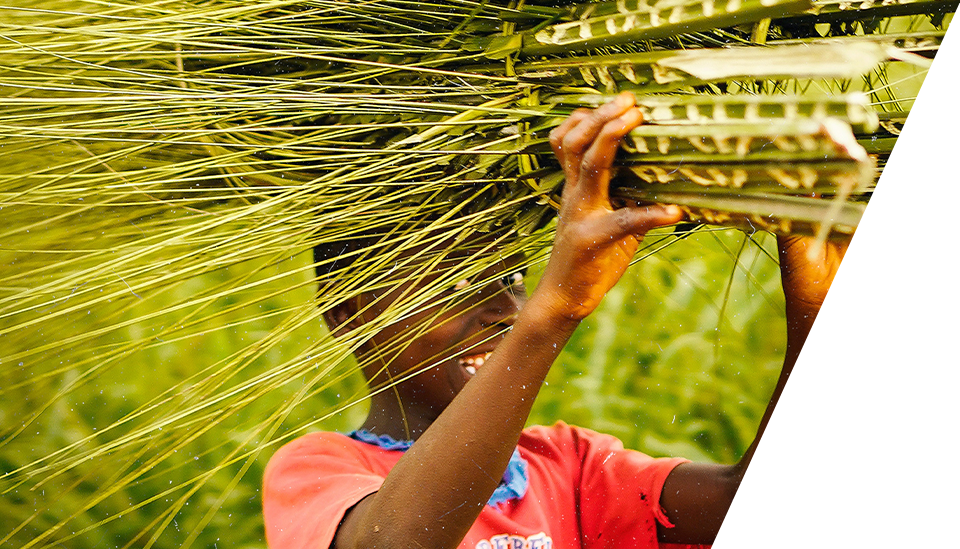Veneless Chimpesa: Why Agricultural Extension Matters
Bahkita Mkwingwiri from Balaka District in Malawi works with Gorta-Self Help Africa as a village-based farm adviser to lead farmers in Bisani village. She and Gorta-Self Help Africa extension agent Veneless Chimpesa were amongst the recipients of a travel bursary to attend a ten-week training course at Shuttleworth Agricultural College in the UK this summer. Farming First interviewed them about their experiences in Malawi and the UK.
Bakhita, what are you responsibilities as a lead farmer in Balaka district?
My role is to help and encourage my fellow farmers how we can improve our families, our community and Malawi as a nation. I share knowledge with them. I grow maize, cotton and pigeon pea, as well as horticulture products. I also encourage working in clubs. This is important because we share knowledge so that we all have enough food in our household.
What are the challenges that farmers in your district are facing, and what practices are you helping them implement?
In Malawi we have the problem of climate change. We do not have regular rain and it affects when we plant. This year we got heavy rain that destroyed the fields. But, because of the training I had from Gorta-Self Help Africa, I planted two seeds per station 60cms apart. My fields were able to withstand the flooding.
What have you covered in the training course so far? Are you finding new techniques to bring home to your colleagues?
We have been learning about soil testing. This is very important because we need to know about the soil health, so we know how to treat it. This is not something we have done before but it is very important. This is something I will tell the farmers in my district about.
Veneless, what are your responsibilities as an extension working in Balaka district?
I have been working with Self Help Africa since 2006, and I work with the farmers on sustainability issues and capacity building. I also help farmers work on business plans and ways to increase their production.
In your application for the training programme, you mention climate change is affecting farmers in your area. What problems has climate change been causing?
One of the main problems that climate change has been causing, besides water management issues, is new pests and diseases. This is contributing to low yields. Farmers are being trained in best crop husbandry practices and integrated pest management practices. We are also linking farmers to plant clinics. Farmers can bring any infected crop to the clinic and the doctor will advise the farmer on what can be done to deal with the problem. These clinics operate like a human doctor’s surgery; they provide advice on demand, tailored to the farmer’s individual need.
There has also been the issue of flooding, which was severe in some parts of Balaka followed by a prolonged dry spell. As an organisation we are encouraging farmers to plant drought tolerant crops like pigeon peas, cassava and sweet potato. Farmers are also encouraged to participate in village savings and loans clubs so that they can venture to small-scale businesses to generate income for the family.
You mention you would like farmers in your district to realise that farming is a business. How can this be done?
We need to encourage farmers to increase productivity to meet market demands. They can do this by joining to farmer organisations like cooperatives and associations, when farmers work together they can produce more. It also gives them better bargaining power with the people who want to buy their crops, so they can get a better price. It can also be done by building the capacity of farmers in agribusiness and value addition: they can learn to by grading and sorting groundnuts. Packaging in different packets to suit different customers needs.
Should extension form part of the upcoming Sustainable Development Goals?
Extension workers are just as important as the technologies themselves. Without an extension worker, there is no way to communicate to farmers how they should be using technologies, in a way that they understand. Many people in Malawi who practice farming are not able to read and write. So an extension worker is very important. Only with their help can farmers really grow their farms and improve their livelihood.
That is why I believe that extension should form part of the Sustainable Development Goals being developed by the United Nations. With smallholder farmers accounting for over 80% of the population and most of them uneducated, extension forms a very significant role in translating the technologies to the farmers.
View the full post here.

